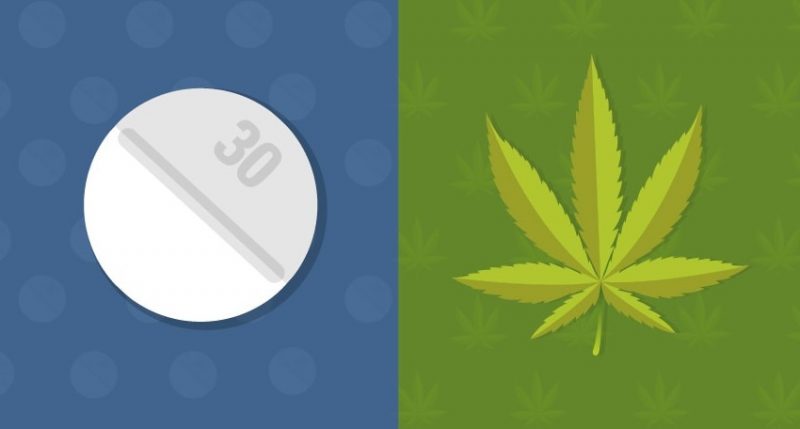STATES WITH MEDICAL MARIJUANA LAWS HAVE LOWER RATES OF OPIOID-RELATED DEATHS, STUDY FINDS
Contributing writer for Wake Up World.COM
A recent study has stumbled upon a surprising finding: in states with legalized medical marijuana programs, opioid painkiller deaths have taken a sharp downward turn.
Data analysis revealed that hospitals failed to see the predicted uptick of pot smokers cross through their doors, but instead found a substantial drop in opioid users. While fears that the legalization of medical marijuana would lead to an increase of cannabis-related hospitalizations were proven to be unfounded, researchers discovered opioid overdoses decreased by 13 percent. Considering deaths from opioid use have skyrocketed over the last decade, the results of the study are significant.
“[M]edical marijuana laws may have reduced hospitalizations related to opioid pain relievers,” study author Yuyan Shi, a public health professor at the University of California, San Diego, told Reuters. “This study and a few others provided some evidence regarding the potential positive benefits of legalizing marijuana to reduce opioid use and abuse, but they are still preliminary.”
Although Dr. Esther Choo, a professor of emergency medicine at Oregon Health and Science University in Portland, was not involved in the study, she found the findings intriguing.
“It is becoming increasingly clear that battling the opioid epidemic will require a multi-pronged approach and a good deal of creativity,” she said. “Could increased liberalization of marijuana be part of the solution? It seems plausible.”
She’s also quick to point out, “there is still much we need to understand about the mechanisms through which marijuana policy may affect opioid use and harms.”
Analyzing the hospital records of 27 states — nine of which have medical marijuana laws in effect — from 1997 through 2014, Shi’s study was the fifth to show significant declines in opioid use or deaths in states that had legalized medical cannabis. This 2014 study published in JAMA Internal Medicine also established that states with medical cannabis laws had lower opioid-related mortality rates, a decrease of around 25 percent. Moreover, a study from Columbia University’s Mailman School of Public Health found that data from 18 states, between 1999 and 2013, showed a reduction in fatal car accidents involving opioid use for states with medical marijuana laws.
While these and other studies help to further support the legalization of marijuana for alleviating both chronic and acute pain, as well as combatting the opioid epidemic, there are those who are not so enamored with the idea. U.S. Attorney General Jeff Sessions is one such vocal opponent.
“I am astonished to hear people suggest that we can solve our heroin crisis by legalizing marijuana,” he told law enforcement officers in Virginia, “so people can trade one life-wrecking dependency for another.”
All the same, an estimated 60 percent of Americans live within the twenty-eight states and Washington, D.C. that now have medical marijuana laws, even though a 1970 federal law puts cannabis in the same category as heroin, a schedule one drug. Incredibly, the Drug Enforcement Administration (DEA) also continues to staunchly uphold its position that marijuana has no medically valid use. Consequently, doctors can only recommend, not prescribe, marijuana, and physicians who work for the federal government cannot even discuss the weed.
However, physicians can, more or less, freely prescribe opioid drugs. The sale of prescription painkillers — like Oxycontin and Vicodin — has quadrupled since 1999. These highly addictive opioids kill 91 Americans a day.
According to a searing report from the Associated Press in 2016, it’s no coincidence that the manufacturers of opioid painkillers outspent the US gun lobby on lobbying and campaign contributions by a factor of 8:1 at the same time opioid-related deaths began to skyrocket. “All of this didn’t happen overnight,” Senator Clair McCaskill (MO) said of the current US opioid epidemic. “It happened one prescription and marketing program at a time.”
Millions Spent by Drug Companies Lobbying Opioids
The report focused on the period between 2006 and 2015, when deaths from opioid use exploded. Business Insider lists a few of the most striking findings:
- Opioid drugmakers including Purdue Pharma, the maker of OxyContin, spent more than $880 million, or roughly $98 million per year, on lobbying and campaign contributions that included efforts to support the drugs.
- Drugmakers and allied advocacy groups employed a yearly average of 1,350 lobbyists in legislative centers.
- In 2015 alone, 227 million opioid prescriptions were given out in the US, or “enough to hand a bottle of pills to nine out of every 10 American adults.”
- Purdue Pharma made $2.4 billion from opioid sales last year alone.
Now, pharmaceutical companies are poised to make even more money off new versions of the drugs, which are marketed as ‘safer’ and ‘tougher to abuse’ — and yet, most likely won’t curb the tide of overdose deaths. According to the report, these ‘abuse-deterrent’ opioids may very well carry the same risk of addiction traditional opioids, and “ultimately are more lucrative, since they’re protected by patent and do not yet have generic competitors.”
All the more reason to legalize medical marijuana across the US and sidestep pharmaceutical companies altogether.
Article references:
- www.reuters.com/article/us-health-addiction-medical-marijuana-idUSKBN16Y2HV
- www.drugandalcoholdependence.com/article/S0376-8716(17)30076-5/abstract
- www.jamanetwork.com/journals/jamainternalmedicine/fullarticle/1898878
- www.businessinsider.com/new-ap-report-opioid-drugmakers-outspent-nra-lobbying-2016-9
- www.apnews.com/86e948d183d14091a80f5c3bfb429c68
- www.thelastamericanvagabond.com/…/reverse-gateway-drug-opioid-deaths-plummeting-states-legal-marijuana
About the author:
 Carolanne Wright enthusiastically believes if we want to see change in the world, we need to be the change. As a nutritionist, natural foods chef and wellness coach, Carolanne has encouraged others to embrace a healthy lifestyle of organic living, gratefulness and joyful orientation for over 13 years.
Carolanne Wright enthusiastically believes if we want to see change in the world, we need to be the change. As a nutritionist, natural foods chef and wellness coach, Carolanne has encouraged others to embrace a healthy lifestyle of organic living, gratefulness and joyful orientation for over 13 years.
Through her website Thrive-Living.net, she looks forward to connecting with other like-minded people from around the world who share a similar vision. You can also follow Carolanne on Facebook, Twitter and Pinterest.








Follow Us!